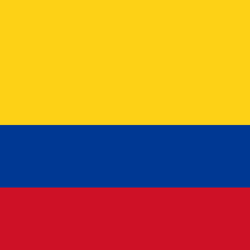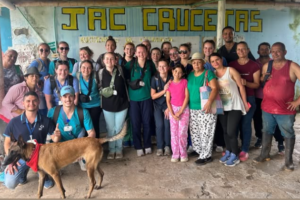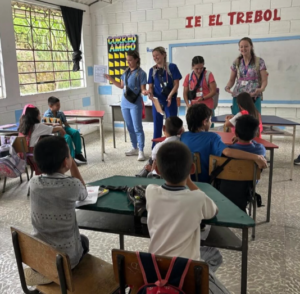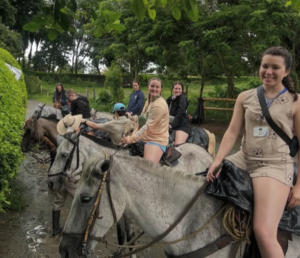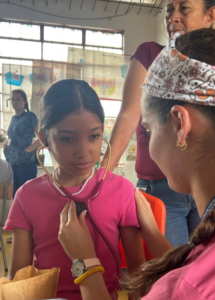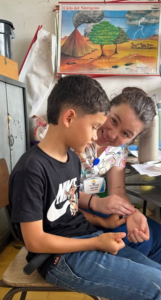About Colombia
Colombia is the second-most biodiverse country in the world, housing 10% of the world’s fauna, 15% of the world’s flora, and producing 15% of the world’s oxygen. Colombia is situated at the meeting place of Central and South America, and it is the only country on the continent of South America with coastlines on both the Pacific Ocean and the Caribbean Sea. Tourists are drawn to Colombia’s clean tropical beaches, lush rainforests, snow-capped Andean mountain peaks, and fertile coffee plantations.
ISL’s service-learning program is in the surrounding villages of the city of Chinchiná in the State of Caldas. There are twenty-one coffee farmworker “veredas” (villages), varying in size from a half dozen families to a hundred homes. This region is known as “Eje Cafetero” (the Heart of Rural Coffee Plantation Country) in the central cordillera of the Andes, with lush green peaks and valleys at an elevation between 4,000 – 6,000 feet. The yearly average temperature is a pleasant 70 degrees. Yes, it rains daily, but almost always only at night, which is very convenient for both farmers and our ISL service volunteers!
Colombia is experiencing an economic and cultural transformation with its recently found civil peace and growing trade with the U.S. and other developing nations. Urban areas have made great strides in reducing poverty through economic development and increased access to higher education, but rural farming regions still need health care, elementary education, and development support.
About 32% of our population still lives below the poverty line, primarily in the rural farm-working communities where ISL volunteers serve. Colombia is the world’s third-largest producer of coffee.
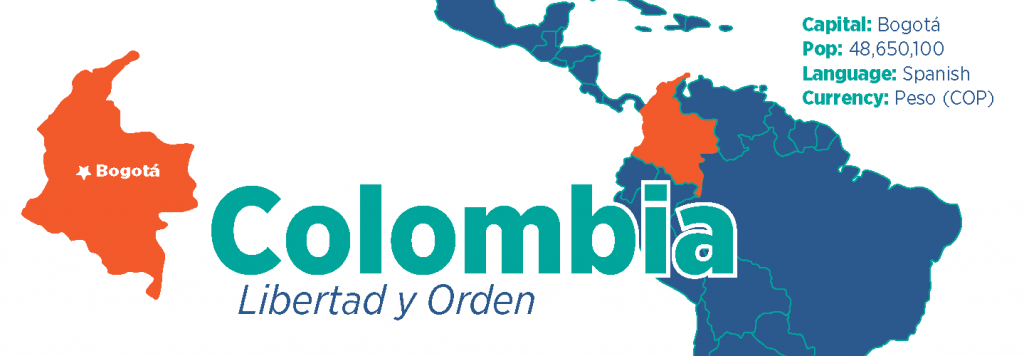
Where We Serve in Colombia
ISL volunteers serve small farm-working communities in central Colombia’s high-altitude coffee bean harvesting region. People here are too far from regional hospitals to receive health care regularly. Most adults do not have a formal education. Many youths face the difficult decision of leaving home for the cities to continue their education past middle school or to stay and help their families as the new generation of coffee farm workers. Even so, you will not find seemingly happier people or a more beautiful setting than the coffee lands of Colombia.
Our Partnerships
As with any great work, it takes great relationships to get the job done well. That’s why ISL Colombia is excited to partner with nonprofits, NGOs, and governmental and religious institutions to better serve the people of Colombia better.
Organizations
Dirección Territorial De Salud de Caldas – State of Caldas Health Department
Alcudia de Chinchiná – City Hall
Hospital San Marcos – Medical rotations, nursing practicums, & pharmacy clinical
Dental Clinics – Dental internships
Bomberos de Chinchiná – Paramedics training & ride-along
Fundación Mundos Hermanos – Shelter for teen girls
Fundación Vida Plena & Saludable – Special needs support & education services
Fundación Proyecto Simon – Childcare center for children of sex workers
Fundación Omaira – Homeless shelter for elderly, free medical clinic, free CNA training
Fundación Coangel – Retirement community
Casa de Cultura – Community Arts Center – music, choir, painting, crafts, theater
Malecón Cameguadua – Migratory bird lake habitat
Chinchiná Animal Shelter – Animal welfare
Chinchiná Community Garden – grow your food program, honeybees, nutrition.
Public school districts – teaching assistantships for all subjects & grades
Colegio Menfis – nonprofit merit-based charter bilingual school, teacher training
Community athletics clubs – soccer, basketball, volleyball, swimming, bicycling, judo, and rollerblading
Schools and Universities
Universidad Católica de Manizales – College of Nursing
Universidad de Caldas – Medical School
Uniminuto – Corporación Universitaria Minuto de Dios – Early Childhood
IDONTEC – Nurse Assistant Training School
What to Expect as a Volunteer
Your Colombian adventure begins as you land at the Matecaña International Airport at Pereira, Risaralda. The ISL Colombia Base Camp is 22 miles away in Chinchiná. After going through Customs and retrieving luggage, volunteers are always met by ISL staff members at the arrival gate. Volunteers are transported by taxi, van, or bus (arranged and paid for by ISL).
If you arrive in daylight, your one-hour ride to the ISL Base Camp Minga House Foundation in Chinchiná will be a feast for your eyes as you enjoy the picturesque, lush fields of coffee, bananas, cacao, sugar cane, papaya, avocado, mango, citrus, plantain, coconut, and giant bamboo. The landscape is accented by brightly colored colonial-style villas, and you will share the road with men on horseback, public transport willy jeeps heaped with passengers, and steady streams of commuters on motorcycles.
When you arrive at the Minga House Foundation, you can access Wi-Fi to check in with your family & friends to let them know you have arrived safely at your final destination. You can also quickly share photos with family and friends as your trip progresses. Bottled water is always available, and ISL staff will stay with you 24/7.
Daily travel time from housing to work sites varies from 10 to 60 minutes by jeep; all work sites are in the State of Caldas under the authority of the State of Caldas Territorial Office of Health. Most recreation and cultural experiences are within the Chinchiná municipality, except the hot springs and theme park, which are 1-2 hours away.
Cultural Exploration Options
With ISL Colombia, you’ll have many opportunities to explore the culture of those you serve. Here are some of the many possibilities.
Café Farm Tour
Learn the process of making coffee from the bean to the cup. Experience the distinct flavors & aromas that exist in different coffees. Learn to differentiate between bad, sound, and excellent coffee. Finally, learn how to make good coffee at home without the expensive equipment. Return home with gained knowledge and a greater connection to the coffee you love.
Café Tasting
Guided tour around the coffee plantation, experience from seed to cup, visit the wet mill and drying stations, cherry-picking and quality selection demonstrations, coffee tasting, and brewing demonstration by an expert barista. Plant your coffee sapling, forever leaving your imprint in Colombia. Don’t forget to name your baby tree!
Historic Swimming Pool
A quick daily dip in our facility’s big guitar-shaped pool can be the perfect thing after a long day of service or the ideal relaxing activity on the weekend. This historical structure has a fantastic view of the coffee landscape. Cost: Free
Cabalgata Horseback Ride
You can horseback ride for 30 to 60 minutes through the coffee landscape, or you can extend the experience to an all-day trail excursion between coffee villages, visiting beautiful nature landmarks, crossing streams, fishing, and cooking delicious traditional meals cooked over coals in open fields.
Termales hot springs
Locals believe these beautiful hot spring pools have medicinal properties. You may also request a massage ($10-40) and enjoy a delicious traditional Chorizo (sausage) dinner ($10) or enjoy the refreshingly cool, natural waterfalls next to the hot springs. Cost: $20
Paseo de Olla
Harvest all needed ingredients to cook a chicken stew alongside a stream, experiencing one of rural Colombia’s most cherished family traditions.
Contra Via
Attend a weekend family street fair hosted by Casa de Cultura and the Mayor’s office. You will find live music, art exhibits, activity stations for children, and other cultural displays. The highlight is promoting health & sport as the main street is blocked to encourage families to share jogging, walking, biking, and rollerblading.
Casa de Cultura
Visit Colombia’s version of your local YMCA for community music, art, theater, and dance classes. Volunteers may engage with the community by participating as students or as facilitators.
Manizales City Tour
Tour the state capital city of Manizales via public transportation for a unique experience among the locals while bargain hunting for Colombian keepsakes, indigenous-made purses, and other wares. Choose to visit different points of interest, such as the beautiful cathedrals and shopping centers, while riding to various tourist points via the aerial gondola lift to explore the fun university district.
Café Cultural La Tarima
Hang out at the famous coffee shop for college students near our base camp hotel to enjoy live music & artistic performances, game boards, and delicious specialty coffee drinks. On the weekend, facilitate the community’s English Conversation Table.
Juan Valdez Café
After serving in rural farm communities for a few days, part of the grand finale is visiting this high-end coffee shop in Manizales, where you will experience a stark contrast in cultures. For example, you’ll see Colombians at the coffee shop who can easily spend $2-5 on a leisurely coffee drink as part of the economic renaissance in the city. At the same time, the communities you have just served may only make that much in one day.
Zumba at the Park
Watch or join dozens of locals doing Zumba at the park on a Friday night. The contagious Latin beat and enthusiasm of the participants will draw you in!
Day at School
Visit public and private schools, K-12, or even universities! Experience an average day in a school setting, perhaps serving as an assistant teacher or assistant coach!
Dance Night Out
People watch & dance with the locals while enjoying traditional regional dance music in a safe and fun setting. Let’s salsa!
Tejo & Billiards
Play a unique traditional local game called “Tejo”. Tejo is a type of horseshoe game where a steel 4.5-lb slug is tossed 60 feet toward a slanted mud bank to hit the center ring (the bull’s eye). One of the ways to make points is by hitting a triangularly shaped paper packet of so-called “gunpowder” that, when struck just right, makes a loud “Bang!”
Colombian billiards is also a prevalent pastime. It is similar to the familiar pool game in the U.S. but consists of only three balls on the table. You score a point when you strike your ball into the other two.
Street Fútbol & Basketball
Accept the challenge of a teen street soccer or basketball game. ISL volunteers are known for accepting the challenge. The wager: ice cream!
Motorcycle & Jeep Rides
Ride an open jeep or motorcycle and gain a unique community view. ISL volunteers often ride in open jeeps to reach the rural villages we serve. On weekends, volunteers can ride a motorcycle with an ISL staff member.
Cooking Classes
Learn to prepare your new favorite Colombian dishes! Whether you want to learn to cook a traditional Colombian dish or simply watch the cooking magic happen, you are always welcome to join our kitchen staff before mealtime.
Parque National del Café
This is a famous amusement park with roller coasters and a Ferris wheel. There are also a variety of cultural coffee attractions, such as an interactive coffee museum and a song & dance show. Full or half-day option, two hours away from ISL Base Camp.
Cost: $15
Recreation Options
Paint Ball
Teams of 3-5 battle with full protective clothing & masks. 200 bullets.
Cost: $10
Spa Night
Designer manicures & pedicures.
Cost: $10
Massage
A professional relaxation service at the hotel; you choose style & length.
Cost: varies from $20-$50
CrossFit
Workout sessions for singles or groups from a private coach are available every evening at a private gym next to the base camp hotel.
Cost: $3
Confamiliar Galicia
This massive 40-acre sports complex has a water park, artificial turf soccer fields, sand volleyball courts, and basketball courts. Also included is a “Park of Memory” and an Indigenous replica of Old Pereira. Full or half-day option, one hour away from ISL Base Camp.
Cost: $10
Lodging
Our accommodations are safe, clean, and within reasonable driving distance to service sites and recreational opportunities.
Volunteers have single beds in a shared room for two but often do not have a roommate.
You can count on easy access to restrooms, showers, and meeting spaces for training and fellowship.
Many ISL accommodations are unique and may include lodgings such as retreat houses, guest houses, or homestays–all of which provide a distinctive cultural experience. ISL Country Coordinators describe your lodging in the Final Trip Document uploaded to your MyISL Portal before departure.
Country Coordinator Spotlight: Glen Galindo
International Service Learning (ISL) is very proud of their Country Coordinators and we would like for you to get to know them, before you visit their beautiful country. All of our Country Coordinators are hardworking, passionate individuals who enjoy serving their communities and working with ISL volunteers, and they all have their own very unique stories.
Where is he from? Where has he lived?
Glen’s journey began in Stockton, CA, but his roots extend far beyond. He spent his formative years in Jalisco, Mexico, before embarking on an educational adventure across California. His academic pursuits led him to Washington State University, where he earned degrees in Higher Education Leadership and Service Learning. His thirst for knowledge and new experiences took him to various corners of the United States, including California, Arizona, Washington, D.C., Virginia, Texas, Washington State, and Idaho. He also had the opportunity to return to his Mexican roots twice before settling in Colombia.
What does he love most about Colombia?
Glen’s love for Colombia is evident in his admiration for the Eje Cafetero (Colombian Andean Coffee Region), a place he describes as having the most beautiful and unique cultural landscape he has ever experienced. This region, which holds 15% of the world’s fauna and 10% of the world’s flora, is the second-most biodiverse country in the world, and UNESCO has declared it a world treasure. The lack of tourists in the area where ISL operates in Colombia provides a unique experience for the volunteers and the locals, who may not have had prior experience with foreigners. Glen also notes the warm welcome Colombians extend to ISL teams, a testament to their excitement and appreciation for the work. And, as a final note, he proudly mentions that Colombia regularly ranks among the world’s most beautiful and happiest nations!
What is his family like?
Glen’s family background is rooted in farming. His parents and siblings were farmers in Mexico and farmworkers in California. This humble beginning instilled in him a strong work ethic and a deep appreciation for community service. In his third year in Colombia, he married Ana Maria, a resident, and they now have three children born in Chinchiná, Colombia, currently ages 3, 6, and 9. Glen’s journey from farming to community service is a testament to his commitment to making a difference in the world.
Where did he grow up? What was his childhood like?
Glen grew up in a small rural community in Mexico, where his father was a farmer. He loved his childhood there. To this day, he says he still feels most comfortable in small communities where life is simple and everyone knows each other. This comfort of living in a small community connects him to our ISL volunteering site in Chinchiná.
What was the most impactful moment for him during his education?
Most of his education has taken place outside of the classroom. He says that while schooling does give us all the opportunity to exercise the skills of reading, writing, research, and analytical thinking, the real-life lessons take place in life challenges where problem-solving has a real-life impact on yourself and others.
What has he worked in besides being a Country Coordinator?
Glen is a former US Marine Corps officer who learned logistics and risk management. He launched a software company where he knew how to grow a private enterprise, and he worked in higher education for about 20 years, where he ran recruitment and retention programs. Then, he started a nonprofit, Migrant Students Foundation, in 2002, dedicated to helping first-generation students of migrant and seasonal farmworkers to reach and succeed in higher education. He still runs MSF as his pay-back endeavor since he grew up in a West Coast immigrant seasonal farmworker family from Mexico.
At what point did he realize what his calling was?
Glen says his calling is to problem-solve. He loves developing ideas into reality. To quote Shakespeare, “Life is a stage in which you play a series of roles. Every role will have an entrance. Every role will have a stage exit, so make the most of your limited time while your eyes are on you. What impact will you have on your audience or those you serve?” He has always had a list of roles he wanted to play in life, and he continues to add roles to that list to this day; he says the trick is lining them up so that one can lead to another and not be afraid to fail because failing is when you are learning. One must pay attention in moments of failure as there are lessons to learn and to apply. No time to be distracted by feeling sorry for yourself. He emphasizes the importance of genuinely embracing each role to the very best of your ability while you still have the blessing of playing such a role.
What was his path to becoming an ISL Country Coordinator?
After leaving higher education to start his nonprofit organization, Glen asked Michael Birnbaum, the founder of ISL, to be one of the board members. ISL then donated Global Health trips to some of his students, and through learning more about ISL, he became even more enthusiastic about what ISL was doing and the difference it was making in the lives of the participating students and the communities they served abroad. He slowly became increasingly involved with ISL until he volunteered to become the founder of ISL Colombia in 2014 and began operating as the country coordinator during the summers. After leading the first team in 2014, not only did he fall in love with coordinating the ISL experience but also even more with the central Andean Colombian paradise known as the Coffee Region.
How long has he been working with ISL?
Glen has worked with ISL since 2014, initially operating only in the summer; in 2016, he began living in Colombia and opened Minga House Foundation, a permanent guesthouse and headquarters facility for ISL volunteers.
A brief summary of what he does as a Country Coordinator:
Glen says he and his team keep volunteers busy serving safely, learning, and having fun! They are up by 6:30 and sometimes don’t end their day until after 10 pm. He knows the participants look forward to their Global Health trips for months and have traveled far to experience everything they can during their time there. They serve intensely and intentionally and have a full schedule seven days a week. His role is to facilitate the most life-changing experience possible. Glen and his team plan every hour of the day with intentional activities that provide the students with a developmental experience designed with goals and reflections for every day.
What inspires him most about what he does?
Glen says that it is inherently human to be of value, to be loved, and to have a purpose. It is tremendously fun for him to develop programs for a needy community and invite others to participate. He says, “I feel of value, I certainly feel loved, and for now, this purpose fulfills me. Sooner or later, at some point, I will turn over this awesome responsibility to someone else; until then, I will play out this role with 110% passion and drive as if today was my last curtain call.”
**Check out this interview of Glen from 2017!
Alumni Stories:
“The only danger in going to Colombia, South America, is wanting to stay” declares nursing instructor Tracey Long RN, PhD. Not gambling with luck, 35 nursing students took luggage full of medical supplies and their nursing skills to Colombia where they served in six medical clinics. In true Las Vegas style, they didn’t leave good health care to chance.
Based in Chinchiná, Colombia, two teams of nurses and nursing students traveled from Southern Nevada to serve in free health clinics with local doctors during a summer college break. Six remote villages and over 1000 people received nursing care and general medicine in clinics led by local physicians trained in tropical diseases. One village required the nursing team to travel a one-hour jeep ride and then 30 minutes on a wobbly wood plank pulled by a motorcycle on a train track to arrive.
Students saw and treated a lot of Chikungunya, a disease carried by mosquitos nesting in standing water, as it had been extremely common in the communities after the tropical rain season. Carly Pasquale, a nursing student from the College of Southern Nevada (CSN) explained, “We gave away a lot of vitamins and basic hygiene supplies like toothbrushes and combs to people in the villages. I have a new appreciation for basic supplies we get so easily in the United States.”
Students were able to serve in a school for disabled adults, paint an elementary school, and de-lice dozens of school-aged children and their teachers. The nursing students and the nursing team also learned about tropical diseases and natural plant remedies used by Colombians in the area. Students also made personal home visits where they assessed the sanitation of outhouses, the rain barrels commonly used for drinking water, and the safety of wood burning stoves. “You could never gain this kind of powerful learning experience in a textbook,” said Saliha Lezha, a nursing student from CSN who served with the team.
By serving internationally, nursing students learned about global and community health through a service-learning experience. Students also participated in a research project during their service-learning trip about cultural competence training. Students learned some medical Spanish by immersion with the help of their bilingual nursing instructor.
Alumni Video Testimonials:
Team University of Maine (UMaine) traveled to Colombia in May 2025.
Following is their video testimonial … enjoy
Colombia's Staff
We love our staff and we are positive that you will too! Each staff member is professional, courteous, and has the same passion as you do: to serve others.

